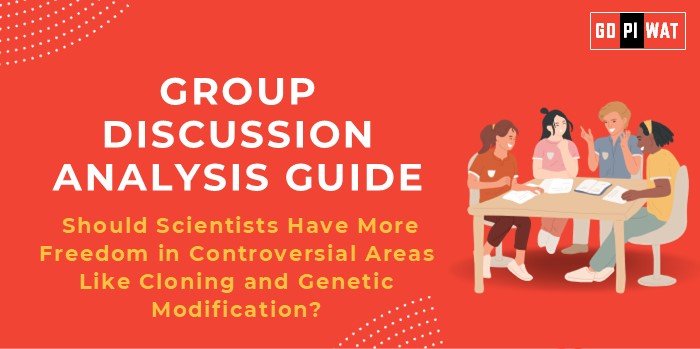📋 Group Discussion Analysis Guide: Should Scientists Have More Freedom in Controversial Areas Like Cloning and Genetic Modification?
🌐 Introduction to the Topic
Scientific freedom is often debated, especially regarding controversial areas like cloning and genetic modification. These fields promise groundbreaking benefits but raise ethical, societal, and environmental concerns. The discussion on whether scientists should have more freedom in these domains holds global importance for policy-making, innovation, and ethics.
📊 Quick Facts and Key Statistics
🔬 CRISPR Revolution: Over 40,000 research papers published annually on gene editing.
🧬 Human Genome Project Impact: Sparked a $1 trillion industry since 2003.
🌍 Global Cloning Laws: 70+ countries have bans or restrictions on human cloning.
📊 Public Sentiment: 60% of surveyed individuals in the US oppose human cloning for medical purposes (Pew Research, 2023).
🧬 Human Genome Project Impact: Sparked a $1 trillion industry since 2003.
🌍 Global Cloning Laws: 70+ countries have bans or restrictions on human cloning.
📊 Public Sentiment: 60% of surveyed individuals in the US oppose human cloning for medical purposes (Pew Research, 2023).
🤝 Stakeholders and Their Roles
- 🧑🔬 Scientists: Innovate and conduct ethical research.
- 🏛️ Governments: Regulate and fund research while protecting public interests.
- 💼 Private Companies: Commercialize technology and invest in R&D.
- ⚖️ Ethics Committees: Ensure research aligns with societal values.
- 🌐 Global Organizations (UNESCO, WHO): Establish international guidelines.
🏆 Achievements and Challenges
✨ Achievements
- 🩺 Medical Advances: CRISPR technology enables potential cures for genetic diseases.
- 🌾 Agriculture: Genetically modified crops increase yield and resilience.
- 🐑 Cloning Milestones: Dolly the Sheep marked the start of animal cloning advancements.
⚠️ Challenges
- ⚖️ Ethical Concerns: Embryonic research sparks debates.
- 🔄 Safety Issues: Potential for unintended mutations.
- 💸 Inequity: High costs of genetic therapies widen socioeconomic gaps.
🌍 Global Comparisons
- 🇨🇳 Success: China’s robust genetic modification policies have advanced agricultural productivity.
- 🇪🇺 Challenges: Europe remains divided over GMO acceptance due to ethical concerns.
- 📖 Case Study: India’s Bt Cotton Adoption: Boosted yields but faced criticism for ecological impacts.
🗨️ Structured Arguments for Discussion
- 👍 Supporting Stance: “Increased freedom in scientific research can lead to unprecedented breakthroughs, like eradicating genetic disorders.”
- 👎 Opposing Stance: “Unrestricted research risks ethical violations and potential misuse, such as genetic enhancements.”
- ⚖️ Balanced Perspective: “Freedom should coexist with stringent ethical guidelines to balance innovation with societal welfare.”
💡 Effective Discussion Approaches
- 📊 Opening Approaches:
- Quote-based: “As Carl Sagan said, ‘Science is not only compatible with spirituality; it is a profound source of spirituality.’ This applies to exploring cloning and genetic modification ethically.”
- Data-driven: “With CRISPR being used in over 20 clinical trials, its potential for curing diseases is evident.”
- 💬 Counter-Argument Handling:
- Highlight successful regulation models like those in the UK.
- Reference the dangers of unregulated cloning as seen in rogue experiments.
🔍 Strategic Analysis of Strengths and Weaknesses
- 💪 Strengths: Medical potential, agricultural innovation.
- 💔 Weaknesses: Ethical dilemmas, potential for misuse.
- 🚀 Opportunities: Address global health crises, food insecurity.
- ⚡ Threats: Misuse by rogue states or unethical actors.
🎓 Connecting with B-School Applications
- 📘 Real-World Applications:
- Policy analysis projects on biotech regulation.
- 🗨️ Sample Interview Questions:
- “Should ethical considerations limit scientific research?”
- “How can governments balance innovation and ethics in science?”
- 📖 Insights for B-School Students:
- Explore biotech markets, public policy implications.


